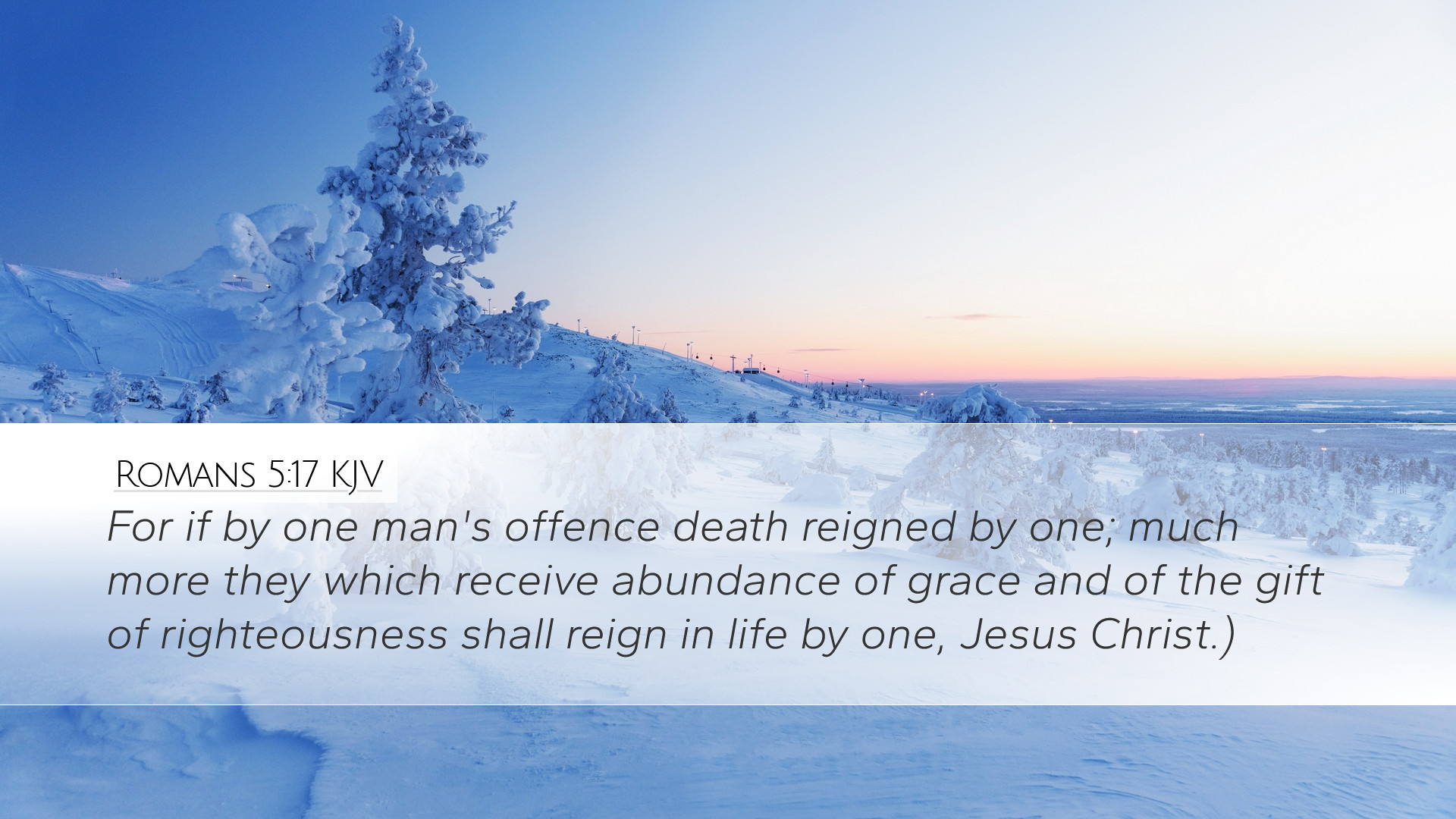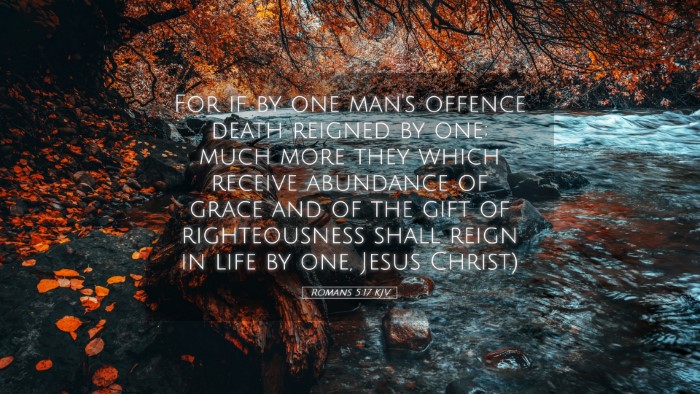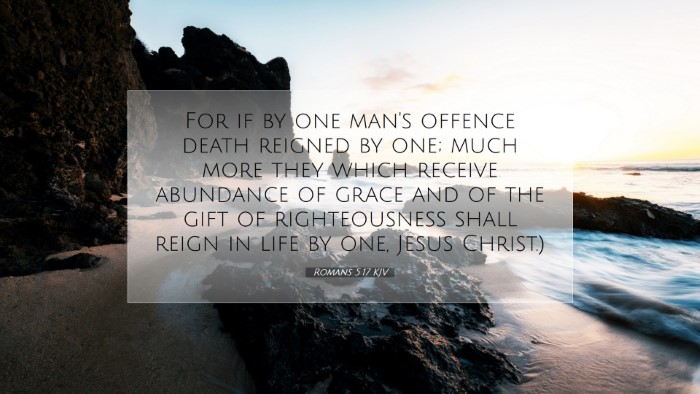Old Testament
Genesis Exodus Leviticus Numbers Deuteronomy Joshua Judges Ruth 1 Samuel 2 Samuel 1 Kings 2 Kings 1 Chronicles 2 Chronicles Ezra Nehemiah Esther Job Psalms Proverbs Ecclesiastes Song of Solomon Isaiah Jeremiah Lamentations Ezekiel Daniel Hosea Joel Amos Obadiah Jonah Micah Nahum Habakkuk Zephaniah Haggai Zechariah MalachiRomans 5:17
Romans 5:17 KJV
For if by one man's offence death reigned by one; much more they which receive abundance of grace and of the gift of righteousness shall reign in life by one, Jesus Christ.)
Romans 5:17 Bible Commentary
Bible Verse: Romans 5:17
"For if by one man’s offense death reigned through the one, much more those who receive abundance of grace and of the gift of righteousness will reign in life through the One, Jesus Christ."
Commentary Overview
In Romans 5:17, the Apostle Paul presents a profound contrast between the consequences of Adam's sin and the abundant provision of grace through Jesus Christ. This verse encapsulates the essence of Christian theology, particularly soteriology, emphasizing the transformative power of grace and the believer’s capacity for victory in life as a result of Christ's redemptive work.
Insights from Matthew Henry
Matthew Henry emphasizes the significance of the "one man" in this passage, referring to Adam and his disobedience that introduced sin and death into the world. He notes that through Adam's offense, death became paramount, reigning over humanity.
- The Contrast of Reign: Adam's offense led to death reigning, but the gift of righteousness through Christ allows believers to reign in life. This life consists not only of eternal life but also a victorious, righteous life on earth.
- The Abundance of Grace: Henry highlights the phrase "receive abundance of grace," indicating that grace is not meager but abundant, overflowing, and continually available to believers.
- Gift of Righteousness: The term "gift" underscores that righteousness is not earned but is a gracious gift from God to those who believe in Christ.
Insights from Albert Barnes
Albert Barnes provides a more analytical approach to this scripture, explaining the theological implications of Paul’s argument. He asserts that the death reigning by Adam’s offense was universal, yet the grace offered through Christ is also universal, albeit contingent on the acceptance of this grace.
- Universal Impact of Sin: Barnes points out that Adam's sin caused death to reign over all mankind, illustrating the total depravity that affects humanity.
- Active vs. Passive Reign: There is a stark distinction in the nature of reigning described. Where sin reigns passively through death, grace and righteousness enable believers to actively reign in life, signifying empowerment.
- Faith as a Means: He emphasizes that receiving grace and righteousness is through faith, affirming that faith is the instrument through which believers access the transformative power of Christ.
Insights from Adam Clarke
Adam Clarke's commentary draws attention to the richness of the language used by Paul. He analyzes the words in their Greek context, allowing for a deeper understanding of their implications.
- Grace as a Sovereign Gift: Clarke argues that the mention of "abundance of grace" signifies not merely a measure but the very nature of God's grace—a sovereign, lavish bestowal that exceeds all sin.
- Righteousness and Rule: His exploration includes a reflection on the concept of believers reigning "in life," implying not just future eschatological hope but a present dynamic where the believer lives under Christ's lordship.
- Implications for Believers: Clarke affirms that this reigning involves an active participation in God’s kingdom, where believers are called to manifest righteousness in their daily living, reflective of their identity in Christ.
Theological Implications
Romans 5:17 invites a rich theological discussion surrounding original sin, the nature of grace, and the role of Christ as the transformative leader of believers.
- Original Sin: The acknowledgment of Adam’s role as the first transgressor introduces key doctrines concerning humanity's inherent sinfulness and the need for salvation.
- Grace vs. Law: This verse serves as a pivotal transition in Paul's epistle from the law to grace, revealing that grace triumphs over sin, marking the foundation of the new covenant.
- Participatory Kingdom: The ability of believers to reign through Christ suggests an active engagement in God's redemptive work in the world, emphasizing the role of believers as ambassadors of grace.
Practical Application for Pastors and Theologians
This passage serves as a profound reminder to pastors, students, and theologians of the core message of redemption that permeates the New Testament. Here are several practical applications:
- Preaching Grace: Pastors should emphasize the abundance of grace in their teachings, encouraging congregations to experience and live out this grace.
- Discipleship Focus: The transformative power of righteousness should be a core element in discipleship ministries, guiding believers to embrace their identity in Christ and live victoriously.
- Covenantal Relationships: Understanding the new covenant allows for a more hopeful perspective on community and fellowship within the body of Christ, empowering believers to support and uplift one another in faith.
Conclusion
Romans 5:17 encapsulates the heart of the gospel—the transition from death through Adam to life through Jesus Christ offers a resounding message of hope. The insights derived from commentaries not only enrich the understanding of this verse but also challenge scholars and practitioners alike to embrace and disseminate the abundant grace of God in their ministries and lives.


